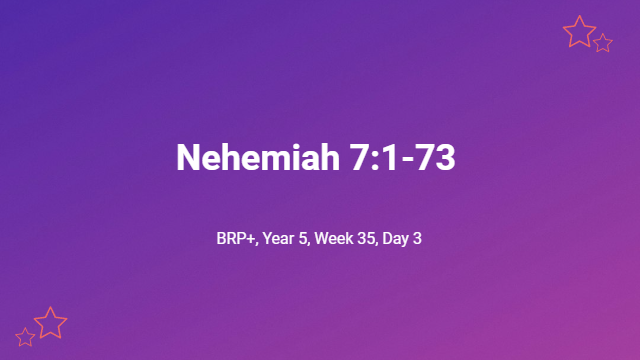Nehemiah 7:1-73
Q.1. What did Nehemiah put in place after the wall was rebuilt? Why were Hanani & Hananiah chosen? What was their role? Where did the guards operate? – (Neh.7:1-4) = The efforts by Nehemiah and the people had been hampered by their enemies. They had also been undermined by Jewish nobles who were related in marriage to Tobiah, who was an Ammonite (Neh.6:17-19). Therefore, Nehemiah placed gatekeepers to guard the entrances. He also bolted the gates until the sun was hot (Neh.7:1-3). He appointed Levites, including the singers, to create a godly and happy environment for the residents who lived in Jerusalem (Neh.7:1 & 4). He promoted his brother, Hananiah, who had first stirred him up to action (c.f. Neh.7:1:2) and Hananiah – … the commander of the fortress, in charge of Jerusalem, for he was a faithful man and feared God more than many (Neh.7:2). They had control over the gatekeepers, so were able to give adequate protection to the city.
Q.2. What made Nehemiah do a new census? How can we account for the discrepancies with Ezra’s register? What kinds of people were included? – (Neh.7:5-60 c.f. Ezra 2:1-70) = Nehemiah was clear that the Lord put it in his heart to do a fresh census, and update the one done by Ezra, recording those who first returned under the leadership of Zerubbabel, the governor, and Joshua, the High Priest from Babylon (Neh.7:5-6). There are some discrepancies with the one recorded in Ezra 2:1-70). This was likely the reason for the new census. Perhaps some who intended to go were prevented from going, and others who decided to join them later were added. It included priests and Levites, singers and gatekeepers, temple servants, plus some related to Solomon’s servants, who were people from the tribes of Israel and Bethlehem.
Q.3. Did the Israelites keep birth records? What limitations were placed on those without identification? How was this problem resolved? Where did their treasures come from? – (Neh.7:61-73)
Again, we observe that God’s people were well educated and kept written records, including their birth records. However, in the upheaval of the exile, some had lost their records – … therefore they were considered unclean and excluded from the priesthood (Neh.7:64 c.f. Neh.7:61). This problem would eventually be rectified after the appointment of – a priest (arose) with Urim and Thummim (Neh.7:65). There were found to be 42,360 Israelites registered, beside some 7,337 servants (Neh.7:66-67). The leaders gave to the work. This included generous contributions from the governor, tribal heads, and the people (Neh.7:70-72). After seven months, the sons of Israel were settled in their cities (Neh.7:73).

